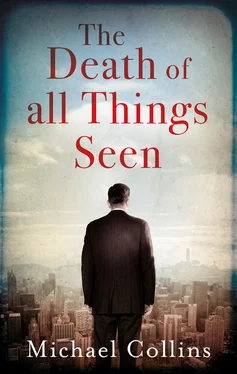Joanne looked up, so Norman could see her life was there before her, in the way life can sometimes make itself known.
‘When I got back, I looked into the Peace Corps as a way out. But, you know, it’s not easy to give yourself up to the prospect of cholera or typhoid or malaria. There are waiting lists of people ready to sign up. Nobody ever says, “I’m going to lose myself in Cleveland!” That same year, I got pregnant a second time. I didn’t tell Peter. He was lost in another round of national academic job searches and had come up empty again. I knew he was cheating on me. We were maxed out on credit cards. I saw a receipt from the John Hancock, a revolving restaurant we had gone to early in our relationship. I was aware of him telling the same stories, but to a different girl, like we were all interchangeable characters on this merry-go-round. He asked me, not long after I saw the John Hancock receipt, if I had ever been with another woman, or if it had any appeal, so, for the life of me, I thought he was trying to shore up all his options, that perhaps the burden of life was better shared with more than one person, in the way certain religions make the allowance for the taking of more than one wife. I told him I wasn’t interested. It wasn’t the answer he was looking for.
‘That Christmas, we got a postcard of Misty in a plaster cast, a family Christmas portrait. Dave was holding Misty like Karolyi did that little girl who won gold. Misty had broken her femur. It ended her career, the capstone of what might have been, and never would have, but it set Misty on the path of gracious acceptance of what the Lord ordained, like the Lord had time to look down on Misty, but that’s how she thought about it, and that’s what counted in the end. They had all these trophies behind her, like the spoils of Tutankhamun’s tomb.
‘In the end, Sheryl was beaten in a primary for the State Assembly, but she ended up getting Dad to enter into some ungodly tax shelter so he got on Medicare. They got the extension built with government money. Dad put his house into a Revocable Living Trust, so I don’t know what I’m entitled to. When I’ve tried to speak with Sheryl, she tells me, “Ask a lawyer to explain it!” It’s a war of attrition, and I’ve been shut out. I’m just coming to terms with that reality.’
Joanne used the heel of her hand against her nose, blinked and blinked again. ‘This is just heartbreak talking, right?’
Norman didn’t disagree. He said, ‘I think you understand life in a way most will never fully realize. It’s part of the process of reassessing and finding peace.’
Joanne seemed appeased, when Norman wasn’t sure he wasn’t just lying, or lying was the wrong word. He just didn’t believe in enlightenment and reform in the way others believed something could be come upon and overcome. The reality was, Joanne had, in fact, talked too long and too candidly, so the essential mystery of her life was settled. Ordinarily, talks like this ended in the payoff of an entanglement of sheets, in a succor and commitment.
In the stalemate of words, Joanne seemed to understand it. She offered an alternative: ‘I could make eggs and toast if you’re hungry?’
Norman put his hand to his stomach for exaggerated effect and said, ‘Starving!’, paving the way to recommencing a normal routine.
Joanne, in her genuine honesty, had set her finger on an essential fault within his work, and, in so doing, Norman felt a deepening understanding of how the drift of days should intersect with the fears and joys of others, and how the megalomania of his life had destroyed a crucial sense of perspective and balance.
IN THE WINTRY light of mid-morning, at the entrance to Lake Forest Cemetery, what Nate Feldman noted was not the solemnity of the cemetery, but the large number of rules there were for a place where only the dead resided.
It took time to find his father’s grave. The newer part of the cemetery stood on a rolling tongue of hill. The grave markers were recessed into the grass. Flowers and wreaths could not be left. It said so on a sign, an ordinance that facilitated the living — namely, the grounds crew — in the expedient sweep of their commercial grade lawnmowers.
When Nate eventually found the grave, he scuffed the snow away with the toe of his shoe and read the marker:
THEODORE L. FELDMAN
SGT
US NAVY WWII
SEPT 16 1922
OCT 19 1987
BELOVED HUSBAND & FATHER
Anyone walking through the graveyard would know that here lay a man who had served bravely and faced the line of fire when it was most demanded. But in this regard, Nate thought, his father’s individuality, his exact service, the nature of his personal history, was erased, so he was as faceless and anonymous as the heaps of corpses who had been bulldozed into mass graves.
His father had found no valor in survival, or, for that matter, in the act of service. He had avoided the fetish of the dead, avoided the rousing sentiment of Veterans Day, when a nation’s thoughts were obliged to settle on the collective heroism of all those who had passed, when history and truth were always far more complex.
He said it to Nate in as many words one evening, his father coming out to the perch of the carriage house out back of the main house to call Nate in for supper. A panel on a TV show was debating the constitutionality of the draft. Nate had been engrossed.
In listening to the show, his father was decided that too much life had been lost in what Eisenhower had called the Industrial Military Complex. If the time came, there was the National Guard as a measure of last resort. His father had connections. It was the best of both worlds. Nate might save face, serve and never see action.
In the interim, there was life to be lived.
*
Nate used the carriage house out back of the main house as his domestic quarters. His father had been liberal and generous and impressed on Nate that he felt that trying to dissuade men from their natural desires, as he put it, was a perversion of the natural order of things, implying a salaciousness in Nate that was never the case. At times, Nate felt he was being absolved for sins he hadn’t actually committed.
His father communicated his tolerance not in so many words but in the way he announced his arrival at the carriage house, his noisy footsteps across the flagstone crossway, ostentatiously sniffing the scent of someone who, he imagined, had just gone scrambling through the back egress. In reality, few girls ever visited Nate in the carriage house, and those who did were acquaintances or study partners.
And yet, his father swore he knew all Nate’s girlfriends by their perfume. He called them Duchess and he called Nate Swank . It was just one of his foibles.
When his draft number came up in the fall of 1970, Nate was attending Northwestern but living at home. He decided that he would not seek a college deferment. He told no one, least of all his father. Nate would not be pressured. He kept his father at bay, while in the back of his mind he was advancing on the idea of seeking his place in the world in the act of serving. It was the unpopular choice, no doubt, but it carried with it, for men like him — college men who did not defer — a noble and gratifying significance.
At the time, he was in a platonic situation with a junior in high school whom he was tutoring in Math — Janice Marsh, the kid sister of his best friend. He eventually told his mother of his decision and begged she say nothing to his father.
A week later his mother betrayed him.
His father arrived at the top of the carriage house stairs while Janice was sitting at a table beside Nate. A book was open between them. The fire threw shadows on the exposed red brick. It could have been a scene from a hundred years before.
Читать дальше












